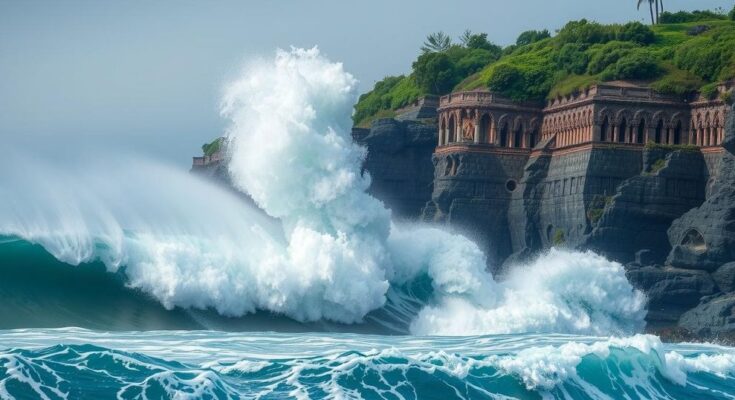Massive waves reaching up to 13 feet have caused devastation along the coasts of Peru, Ecuador, and Chile, resulting in three fatalities and nearly 100 port closures. The severe weather has particularly impacted the fishing industry and prompted safety measures across the affected regions.
Recent severe weather has led to large waves battering the coasts of Peru, Ecuador, and Chile, causing significant devastation and resulting in three fatalities. Waves reached heights of up to 13 feet (4 meters), prompting the closure of nearly 100 ports across the region due to perilous conditions. In Ecuador, the Secretary for Risk Management, Jorge Carillo, labeled the occurrence an extreme phenomenon, with officials warning of similar future incidents. Tragically, two lives were lost in the Manta region of Ecuador, while a 30-year-old man was found deceased on a beach in Chile.
The harsh conditions have led to the shutdown of nearly all ports in Peru, where the navy has reported that while the massive waves are expected to continue, signs of normalization might begin on Monday, with a full return to typical conditions projected for early January. According to the head of the naval Oceanographic Department in Peru, Enrique Varea, the origin of these waves can be traced back to winds generated off the United States coast. The impact has been devastating; in some coastal areas, public squares and jetties have been submerged, compelling residents to seek higher ground for safety.
Fishermen have been particularly hard-hit during this ordeal. Many have reported damage to their boats, and those that remain are unable to venture out in the tumultuous waters. In response to the crisis, the navy successfully rescued 31 stranded fishermen, although approximately 180 others are still at sea. Authorities have implemented numerous beach closures and restricted public access to mitigate the risk of further fatalities. In Callao, adjacent to Lima, beaches have been closed to the public, and tourists have been advised against venturing out.
Roberto Carrillo Zavala, the mayor of La Cruz district, assessed the damage alongside Defense Minister Walter Astudillo Chavez, emphasizing the economic repercussions on the local fishing industry. The National Emergency Operations Center in Peru has confirmed that this severe weather began on Christmas and is anticipated to persist until January 1.
The recent extreme weather along the coasts of Peru, Ecuador, and Chile illustrates the vulnerabilities faced by coastal communities in the face of rapidly changing climate conditions. The occurrence of unusually large waves is typically influenced by wind patterns and oceanographic conditions, which can lead to significant safety hazards and economic disruptions, particularly in regions reliant on fishing and tourism. Understanding the underlying causes and effects of these phenomena is critical in assessing future risks and implementing adequate preventative measures.
In summary, the devastating impact of massive waves affecting the coasts of Peru, Ecuador, and Chile has resulted in three fatalities, considerable economic losses, and widespread port closures. Local authorities have taken critical measures to protect residents and fishermen from the ongoing dangers, emphasizing the importance of disaster preparedness and resilient coastal management in the face of such extreme weather events.
Original Source: newscentral.africa




